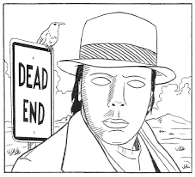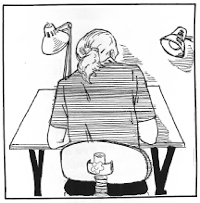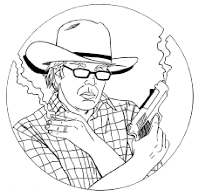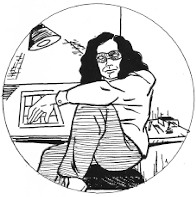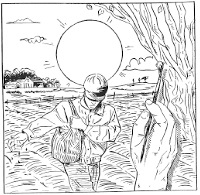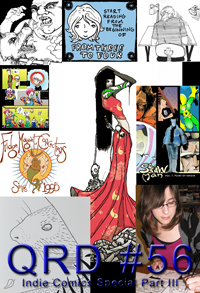
July 2012
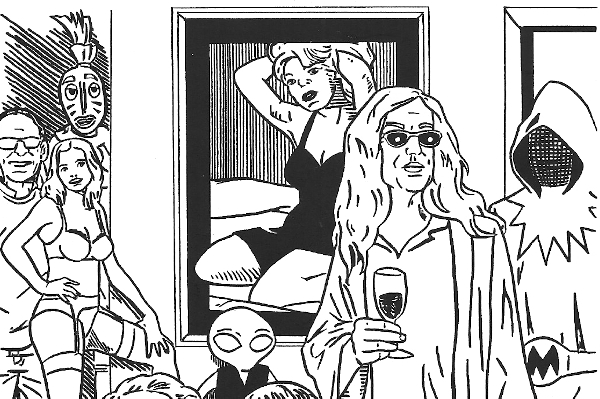
City: Polacca, AZ
Comics: Zinc Comics
Websites www.zinccomics.com
QRD – How old were you when you first got into comics & did you always stick with them or did you come back to them?
Brian – Although I always read the Sunday funnies & watched cartoons on television as a child, other than a few Mad Magazines I never really bought any comic books. It wasn’t until I began studying sign painting after high school & some cat asked me to letter their comic that I “got into comics.” The bloke gave me a few comic books so I could sample the lettering & I got hooked from then on. The fact that the books he gave me to look at just happened to be Miller’s “Daredevil” & Sienkiewicz’s “Moon Knight” probably had a lot to do with it though too.
QRD – What was the first comic book you ever bought?
Brian – I really can’t recall or hazard to guess. I know that I bought a few Mad Magazines coming up & a couple Heavy Metals in high school. However, when I really “got into comics” Byrne’s Fantastic Four; O’Neil & Janson’s Daredevil; Pasko, Bissette, & Totleben’s Saga of the Swamp Thing; & Moench & Colan’s Detective Comics were the ones I looked for on the spinner rack at the White Hen Pantry down the street from my apartment.
QRD – How old were you when you put out your first comic?
Brian – I got into the game late & I first put out a series of mini comics with titles like “Drag,”“Strip,” & “Blood” in 1991 when I was 30 years old. I was also drawing a monthly comic strip for a free newspaper entitled “Zinc Alloy” around the same time. Two years later I self-published two full-sized “Lost Toys” comic books with large print runs & actually consider these to be my first “real” comics.
QRD – What decade do you think produced the best comics?
Brian – Now, this is a hard question to answer as it’s entirely a matter of opinion & therefore purely subjective. Yet, it’s hard to argue with the fact that in the early 90s cartoonists were really doing some amazing work, but there again the same can be said for the 30s.
QRD – Why comics instead of just writing or drawing?
Brian – To be honest, I’m simply not a good enough writer or artist. I need to use both words & pictures to tell my stories &/or get my point across. However, I also believe that they make a pretty powerful combination & are capable of doing things that neither can do individually as well.
QRD – Do you see mini-comics & indie comics as paths to mainstream comics or as their own unique media?
Brian – I see them all as one in the same & believe a mini-comic can be just as good if not better than a mainstream one & vice versa. I don’t like any comic merely because it has indie cred nor am I anti-superhero per se. I also think that too many people get hung up on color, paper etc. & miss out on some great comics. I personally love mini-comics because of their hand made object d’art quality.
QRD – How many copies of your comic do you print in your first run?
Brian – I printed 2,000 of each issue of Lost Toys, but for the Zinc Comics digests I only print 100 of each. Then for my micro comics I used to only make about 25 of each, but nowadays I print only around 5 at a time then print more as needed.
QRD – How much do you think comics should cost?
Brian – A comic should cost at least twice what it cost to print, but you also have to consider the market value & your own hourly wage too. No matter what though, you are usually going to lose money more often than not until you build an audience or have a huge print run.
QRD – How many books do you produce a year & how many would you like to?
Brian – One if I’m lucky, although I mainly post stuff online these days anyway & I’ve been posting something new at least weekly for 4 or 5 years. Still, I must admit that I am currently posting older stuff at the moment though, while I’m working on my new book.
QRD – Do you think stories should be serialized or delivered as complete works?
Brian – I like serialized comics, but they have to come out in a timely manner for it to work & I’ve made the mistake of serializing stories with too much time between publications for anyone to remain interested. Stand-alone stories are good, but everyone wants to do a big “graphic novel” these days & I don’t think that is necessarily a good thing. I don’t even like the term “graphic novel” as I think both comic &/or comic book are more than sufficient. Believe you me, you don’t want to get me started on how much I hate the term “floppy” either.
QRD – How are comic strips different than comic books & which medium do you prefer?
Brian – I think that comic strips & comic books use the exact same language & that the only difference is in how an artist chooses to use them, as both can be either poetic or novel. I actually think the strip is the purer of the two, but it is so tragic just how small they are drawn & reproduced now that it’s hard to imagine an adventure strip as good as Steve Canyon today.
QRD – How long is it from when you start a comic until it’s printed?
Brian – Since, there is no market for my work & I create my comics for myself as much as anyone it can take me anywhere from 6 months to 3 years to do a single issue.
QRD – What do you do better with your comics now than when you first started?
Brian – I’d like to think everything, but the dialogue lettering is the only thing I can say with certitude that I’ve seen any noticeable improvement in over the past 20 years.
QRD – At what point in the artistic process do you work digitally?
Brian – Other than scanning drawings to post online, I’m old school & do everything by hand. I’m an analog man in a digital world. If I were ever to learn Photoshop I’d be dangerous.
QRD – What do you think of digital comics & webcomics?
Brian – I like them a lot, but I don’t really like reading on a computer screen. So, if a strip is too wordy I tend to lose interest. Webcomics like Hans Rickheit’s Ectopiary & The Abominable Charles Christopher by Karl Kerschle are good examples of what I believe work well online.
QRD – Do you prefer working in color or black & white?
Brian – I work black & white exclusively as my color sense is piss poor, but I actually prefer black & white comics too. I admit it’s hard to imagine Ware or Hornschemeier’s stuff without color, but I like Marvel’s Essential collections precisely because they lack the original color. I also don’t think that colorizing Smith’s Bone was worth the time or trouble or that it improved the comic one iota either.
QRD – How many different people should work on a comic & what should their jobs be?
Brian – I have no problem with a writer, penciler, inker, letterer, & colorist working on a comic as a team & willingly admit that there have definitely been some great comics as a result of this. However, having said that, I still think that the very best comics are created by a single individual as they tend to be much more personal & have a quality of a handwritten letter that collaborations lack.
QRD – How do you find collaborators?
Brian – My inking is without a doubt my biggest weakness (ask anyone) & in a perfect world I would hand a penciled page over to an inker to finish. The problem with that is I’ve no money to pay someone to do that & every artist I would want to ink my pencils is far too busy with their own work to want to collaborate. Only a few people have ever offered to ink my stuff for free & since I’m kind of a control freak I’ve only allowed one of them to ever do so.
QRD – How tight do you think a script should be as far as telling the artist what to draw?
Brian – Not very since it’s far easier to write “an army of guerilla soldiers overtake an airplane on the tarmac under a star filled sky” than it is to actually draw it. Especially since the script will probably also specify that “their rifles are armalite M15s & that the soldiers name tags should all be easy to read.” One also must take into consideration that this will be only one of the many panels on said page.
QRD – What comic book person would you be most flattered to be compared to?
Brian – I guess I see myself as a cross between Glen “Askari Hodari” Brewer & Strangehaven’s Gary Spencer Millidge. So, if anyone else ever did too, I’d be more than flattered. Nonetheless, if someone were ever to compare me to P. Craig Russell I would consider that the ultimate compliment.
QRD – What do your friends & family think of your comics?
Brian – They are all pretty supportive, especially my wife. Still, a cousin did once tell me that I needed to “quit pretending to be an artist” & I don’t think anything I’ve ever created made my Father more proud than the steel belted tires I made while working for Firestone.
QRD – What do you think of superheroes?
Brian – I like them a lot especially those from the Golden Age. However, I really do have a special soft spot in my head for the bizarre ones such as Chadwick’s Concrete, Simpson’s Megaton Man, Allred’s Madman, & of course Burden’s Flaming Carrot. I can definitely understand why some don’t like superheroes, but I do not understand the total disdain & derision some have for the cape & mask crowd. I also find it funny just how many so called “indie” artists jumped at the chance to contribute to Marvel’s latest incarnation of Strange Tales.
QRD – Marvel or DC?
Brian – Can I take the fifth? I’m actually currently boycotting both companies & would rather not give either any free advertising.
QRD – What comic characters other than your own would you like to work with?
Brian – Mike “Spy Guy” Kitchen & David “Straw Man” Branstetter recently co-created a character named The Psychedelic Tangerine that I have a personal affinity for & like to think I could do something special with.
QRD – Ideally would you self-publish?
Brian – Ideally yes or at the very least in conjunction with a company that only published creator owned books & didn’t expect me to sign a work for hire contract.
QRD – What conventions do you try to attend & why?
Brian – My comics are so far beneath the underground that I’ve only been invited to attend the Iowa Comic Con twice. The first time, I had a table next to Josh Cotter who had just put out his first Skyscrapers of the Midwest mini comic, yet I could tell then & there that his was a name to remember.
QRD – What do you do to promote your books?
Brian – I’m afraid I’m pathetic when it comes to self-promotion & truth be told I do nothing more than offer them for sale in my Webcomicsnation Swap Meet Store & post the occasional link to it on Facebook. I also occasionally sell a few on consignment in those stores & distros that take pity upon me.
QRD – Do you think your comics are well suited to comic shops or would sell better elsewhere?
Brian – My work is too alternative for mainstream audiences & too commercial for the indie comic crowd. My comics would probably sell best in an old curio shop that sells homemade clothing, handmade chapbooks, & naive outsider art.
QRD – What other medium would you like to see some of your comics made into (television, film, games, action figures, etc.)?
Brian – I actually think comics work best as comics, but I am poor enough that given half a chance I’d sell out in a New York minute & to that end my wife is currently working on a screenplay based on one of my comics.
QRD – Do you consider yourself a comic collector or a comic reader or both?
Brian – I am definitely a reader as I have never been much for mylar bags & backing boards. Also, since I don’t buy many new comic books anymore, I guess I’m more of what you would call a comic re-reader at that.
QRD – What do you see as the most viable mediums for comics distribution 10 years from now?
Brian – What we need more than the next great comic book is a few distributors that will give Diamond a run for their money & keep them honest. In lieu of that, the internet is probably the unknown cartoonist’s last & only hope.
QRD – What would you like to see more people doing with comics?
Brian – In my opinion, there is a sameness to most comics nowadays, especially since the advent of so many schools & courses where you can learn cartooning. Even the DIY crowd have a recognizable set of aesthetics it seems now. I guess I’d like to see young artists break these new & self-imposed rules & repeatedly reinvent comics again in such a way that neither I nor McCloud could ever possibly imagine. I want to be surprised.
QRD – Anything else?
Brian – Nope, I think I’ve said far too much already.







